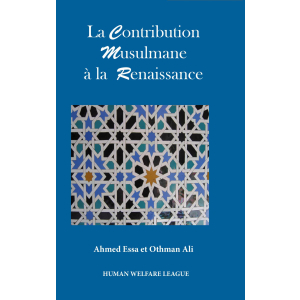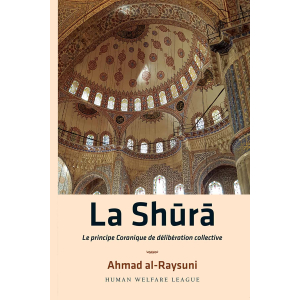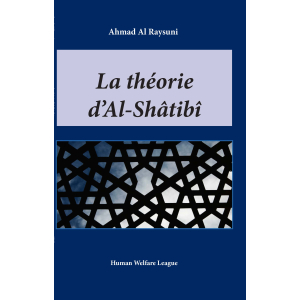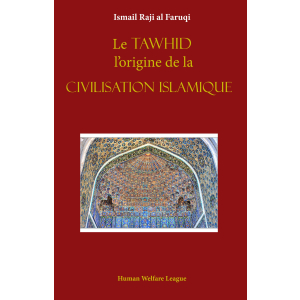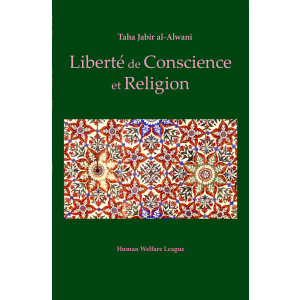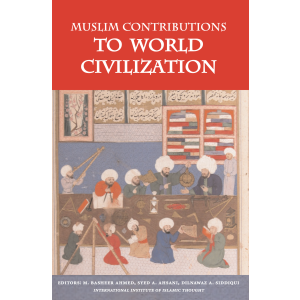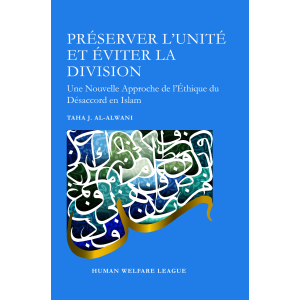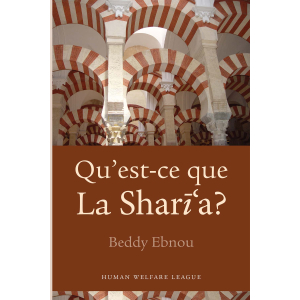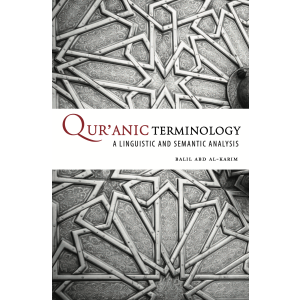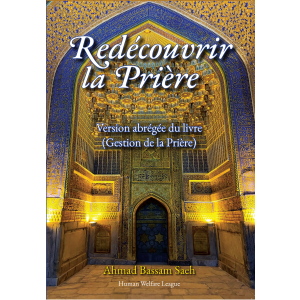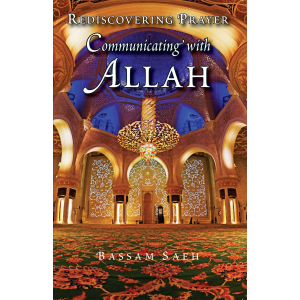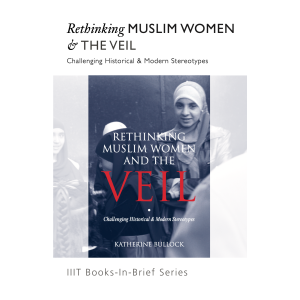-
La Contribution Musulmane à la Renaissance
$4Overview
Ce livre publié sous le titre « Etudes en civilisation Islamique »sous sa forme complète en 2010 et 2011 renferme des données très précieuses sur les contributions islamiques à la civilisation moderne mais qui ont été camouflées par les Occidentaux. C’est aussi un rappel aux savants occidentaux que sans les savants et scientifiques musulmans il n’y aurait pas eu de Renaissance en Europe.
Ahmed Essa fut professeur à l’Université du Nevada, Reno, de 1967 à 1991 où il enseignait la littérature comparée et la création littéraire.
Né en Inde, il a passé ses premières années à Pietermaritzburg et à Durban, en Afrique du Sud. Il fut le fondateur de la Société Musulmane du Nord du Nevada. En 2003, il a reçu le prix de Citoyen du Monde du Centre International du Nevada du Nord.
Othman Ali est docteur de l’Université de Toronto et licencié de l’Université de Guelph- Canada.
Il fut professeur au département d’histoire et de civilisation à l’Université de Ryerson, à Toronto, de 1994 à 1998.
Il enseigne actuellement au département d’histoire à l’Université de Salahaddine, à Arbil en Irak. Il est également Président du Centre d’Études Turco-kurde dans la région d’Arbil-Kurdistan en Irak -
La Shūrā Le principe Coranique de délibération collective
$3Overview
La Shura, dans ce livre, Al Raysumi propose les variantes d’une possible application de la Shura après analyses profondes et un rappel de son histoire évolutive. Il démontre une nouvelle orientation qui fait entrevoir des aspects de la Shura que d’autres n’ont fait que banaliser jusqu’ici. L’auteur recommande la Shura aux musulmans engagés comme outil de combat dans la constructionet reforme sociétale.
Prof Ahmad Al-Raysuni est titulaire d’un doctorat en études islamiques de l’université «Muhammad al-Khamis» (Rabat, Maroc). Il a travaillé au ministère de la Justice. Il est le rédacteur en chef du journal al-Tajdid et membre de l’Association des Oulémas musulmans au Maroc. Le Professeur al-Raysuni a écrit en arabe un certain nombre de livres et d’articles sur Al-Maqasid, dont certains ont été traduits dans d’autres langues. Il enseigne actuellement Usul al-fiqh et Maqasid Al-Shari’ah au Collège des Arts et des Sciences Humaines (Université de Muhammad al-Khamis, Maroc). -
La théorie d’Al-Shâtibî
$3Overview
Theorie d’Al Shatibi L’imam Abu Ishaq al-Shatibi (mort 790A.H/1388), le sujet de cet ouvrage, illustra et inspira des études sur les principes et les finalités da la loi islamique. Ses méthodes offrent une compréhension solide, fondée du Coran et de la Sunnah. Cet ouvrage met en évidence l’importance d’une méthode qui s’appuie sur des universaux législatifs, méthode qui permet de comprendre et d’utiliser des textes donné. Tout acte d’ijtihad et de la pensée islamique repose sur les principes et objectifs universels de la loi islamique.
AHMAD AL-RAYSUNI est titulaire d’un Doctorat en études Islamiques de l’Université Muhammad al-Khamis, Rabat, Maroc. Il a travaillé au Ministère de la Justice, est l’éditeur du journal al-Tajdid, et est membre de la Jamiyat al-Ulama (l’Association des Savants Musulmans) au Maroc. Le Professeur Raysuni a écrit plusieurs ouvrages et articles sur al-Maqasid en arabe, dont certains ont été traduits en diverses langues. Il enseigne actuellement les Usul al-Fiqh et les Maqasid al-Shari‘a au Collège des Arts et Sciences Humaines, Université Muhammad al-Khamis. -
Le Tawhid a l’origine de la Civilisation Islamique
$4Overview
Ce livre est une étude sérieuse sur l’origine et l’importance de la civilisation islamique. L’auteur, dans un style qui lui est propre nous démontre que l’élément inaliénable des composants de la civilisation islamique reste le Tawhid, l’affirmation qu’il n’y a de dieu que Dieu. Cette formule explique qu’Allah est le Seigneur et le seul Créateur, tout autre est créature, qu’Il est Unique, Absolu et Transcendant. Donc le Tawhid constitue la source et le facteur déterminant du phénomène de la civilisation Islamique et le caractère unique de l’Unicité de Dieu dans la construction et la refonte de la société. L’essence de la civilisation comprend les trois principes dominants qui sont l’unité, le rationalisme et la tolérance.
Ismail Rājī al-Fārūqī (1921 au -1986) était un philosophe américano-palestinien, largement reconnu par ses pairs comme une autorité en matière d’islam et de religion comparative. Il a passé plusieurs années à l’université Al-Azhar au Caire, puis a enseigné dans plusieurs universités d’Amérique du Nord, notamment à l’Université McGill de Montréal. Il était professeur de religion à la Temple University, où il a fondé et présidé le programme d’études islamiques. Al-Faruqi était également le fondateur de l’Institut international de la pensée islamique. -
Liberté de Conscience et Religion
$4Overview
Liberte de Conscience et Religion:Ce livre traite d’un sujet qui, ces dernieres annees , avait souleve un tolle a l’echelle internationale, surtout dans les medias occidentaux face a la condamnation de Abu Al Mannan en Afghanistan , l’execution de Mohammad Taha au Soudan et l’affaire Rushdie.
L’auteur prend position contre toute peine legale a l’egard de l’apostasie et se justifie meme en produisant des preuves incontestables dans le Coran et les Hadiths. Ce livre nous invite a un debat stimulant pour tous ceux qui se passionnent pour la chose legale.
“Pas de contrainte en religion”, enonce le Coran: Proclamation de la liberte humaine, principe fundamental de liberte d’agir, de penser et d’expression!
Taha Jabir Alalwani (1935-2016), diplômé de l’Université Al-Azhar, est un spécialiste de renommé internationale et un experte dans les domaines de la théorie juridique islamique, de la jurisprudence (fiqh) et de usul al-fiqh. Il est l’auteur de nombreuses oeuvres et a été membre de l’Académie islamique du fiqh de l’OCI et président de l’Université de Cordoba à Ashburn, en Virginie, aux États-Unis -
Muslim Contributions to World Civilization
$0Overview
Islam’s brilliant contributions to science, art, and culture, are a timeless and precious heritage, which should be historically preserved for future generations. The great achievements of Muslim scholars are rarely if at all acknowledged in formal education, and today their identity, origins and impact remain largely obscure. This collection of papers aims to give readers a brief introduction to the intellectual history of Muslims and the contributions that eminent Muslim scholars have made in certain specific fields of knowledge including basic and applied physical and biological sciences, medicine, legal and political theories and practices, economic and financial concepts, models, and institutions, etc. The preservation of civilization necessitates a better understanding, sharing, and recognition of our common human heritage. Given today’s widespread negative stereotyping and falsely generated misunderstanding of Islam and Muslims, the publication of these papers on “Muslim Contributions to World Civilization” is vital to help repair the wrong that is being perpetrated and restore the historical truth, which is being distorted.
-
PRÉSERVER L’UNITÉ ET ÉVITER LA DIVISION Une Nouvelle Approche de l’Éthique du Désaccord en Islam
Original price was: $12.$10Current price is: $10.PRÉSERVER L’UNITÉ ET ÉVITER LA DIVISION
Une Nouvelle Approche de l’Éthique du Désaccord en Islam
TAHA J. AL-ALWANI
-
Qu’est-ce que La Shari‘a?
$3Overview
Qu’es-ce que La Shari‘a? Qu’est-ce que l’Islam dit ou encore qu’estce que le Coran prescrit sur ceci ou cela ? Ces interrogations font désormais partie intégrante de la sémiologie éditoriale ordinaire. Elles relèvent des traits caractéristiques de notre époque. Aux variantes multiples, elles sont beaucoup moins posées dans des écoles religieuses ou des facultés d’études islamiques que dans les salles de redaction et les studios des médias de masse. L’islam / Islam, la Shari‘a , les fatwa (responsa) etc. ont déjà leur mode d’existence dans l’univers lexical propre à la subjectivité consumériste dominante.
Mohamed Beddy Ebnou Directeur de l’Advanced Studies Research Centre (ASRC) et de Institute for Epistemological Studies — Europe (IESE), Bruxelles. Il enseigne la finance internationale et la finance islamique à l’Université Paris-Dauphine ainsi qu’à 1’Université de Cergy-Pontoise. -
Qur’anic Terminology: A Linguistic and Semantic Analysis
$0Overview
There is no way to understand the Qur’an properly, or to elucidate as accurately as possible the meaning of its verses, without studying Qur’anic terminology and concepts. Taken together these sum up the universal truths of the Faith (the great moral code), not only animating the text and giving it incredible life, precision, and flexibility, but also enriching the communication of the Qur’anic message through their beautiful and comprehensive nature. This study aims to provide a broad glossary of key Qur’anic terms and set forth these terms’ meanings, both semantically and linguistically, within their Qur’anic context. The format is organized in such a way as to facilitate ease of under-standing, guiding the lay reader carefully and logically through the various nuances of usage and meaning. The meaning of a given Qur’anic term will vary depending on the manner and the context in which it is used, and on the issues and questions in relation to which reference is made to it, and just as a concept gives rise to a term, so also does the term and its usage act to shape the concept. These and other aspects of the Divine communication are mapped and explored, leaving us with a greater appreciation of the Qur’an’s depth and what makes it a linguistic and literary miracle.
-
Redécouvrir la prière Version abrégée du livre (Gestion de la prière) Ahmad Bassam Saeh
Original price was: $8.$5Current price is: $5.Redécouvrir la prière
Version abrégée du livre
(Gestion de la prière)
Ahmad Bassam Saeh
-
Rediscovering Prayer Communicating with Allah
$3Overview
Muslims are required to pray five times a day, but for too many of us these are little more than physical movements devoid of any spirit or divine connection? In contrast with such routine outward performance, the Prophet characterised prayer as “the spiritual ascent (mi[raj) of the believer.” In a modern world of constant distraction, how are we to achieve the communion with the Divine that prayer is supposed to be? How can we reach the state of the Prophet who would ask his Companion Bilal to give the call to prayer with the expression: “Give us repose through it, O Bilal.” The present short but valuable work provides us with the answer.
Dr Bassam Saeh, a scholar of the Arabic language, casts a refreshing new perspective on prayer in the modern context. With practical examples, and in contemporary idiom, he charts a path for the seeker of God’s pleasure to attain a deeper sense of consciousness and devotion in prayer. The short chapters of this work are designed to be read and reread as constant reminders for us to renew our commitment to the Divine in our prayer.
Dr Bassam Saeh holds a BA in Arabic literature from Damascus University, and an MA & PhD in modern Arabic poetry from Cairo University. He has taught at a number of universities across the Middle East and Europe. In 1990 he founded the Oxford Academy for Advanced Studies and served as its principal until 2005. He has also been a presenter of several radio and TV programs, and has authored a number of books. He currently resides in Oxford, England. -
Rethinking Muslim Woman & The Veil: Challenging Historical & Modern Stereotypes
$0Overview
A powerful critique of the popular western notion that the veil is a symbol of Muslim women’s oppression. In postulating a positive theory of the hijâb, the author challenges with great sophistication both the commonly held view of Muslim women being subjugated by men, as well as the liberal feminists’ who criticize the choice of women to cover themselves as ultimately unliberating.
The author argues that in a culture of consumerism, the hijâb can be experienced as a liberation from the tyranny of the beauty myth and the thin “ideal” woman.
In dispelling some widely held myths about Muslim women and the hijâb, the author introduces respectability to the voice of believing Muslim women, claiming that liberation and the equality of women are fundamental to Islam itself.


